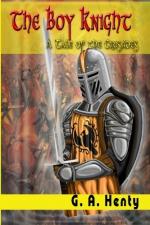After his departure an animated council took place. Cnut and the outlaws, burning with indignation, were ready to attempt anything. They would, had Cuthbert given the word, have attacked the castle that very night. But Cuthbert pointed out the absolute impossibility of their carrying so strong a place by such an assault, unprovided with engines for battering down the gates. He said that surprise would be impossible, as the knight would be sure to take every precaution against it; and that in the event of such an attack being attempted, he would possibly carry his threat into execution, and murder Dame Editha before their eyes. Cnut was like a madman, so transported with fury was he; and the archers were also beside themselves. Cuthbert alone retained his calmness. Retiring apart from the others, he paced slowly backward and forward among the trees, deliberating upon the best course to be pursued. The archers gathered round the fire and passed the night in long and angry talk, each man agreeing that in the event of their beloved leader being sacrificed by Sir Rudolph, they would one and all give their lives to avenge him by slaying the oppressor whensoever he ventured beyond the castle gates.
After a time, Cuthbert called Cnut to him, and the two talked long and earnestly. Cnut returned to his comrades with a face less despairing than that he had before worn, and sent off at once a messenger with all speed to a franklin near the forest to borrow a stout rope some fifty feet in length, and without telling his comrades what the plans of Sir Cuthbert were, bade them cheer up, for that desperate as the position was, all hope was not yet lost.
“Sir Cuthbert,” he said, “has been in grievous straits before now, and has gone through them. Sir Rudolph does not know the nature of the man with whom he has to deal, and we may trick him yet.”
At eleven o’clock the next day from the walls of Evesham Castle a body of archers one hundred and fifty strong were seen advancing in solid array.
“Think you, Sir Rudolph,” one of his friends, Sir Hubert of Gloucester, said to him, “that these varlets think of attacking the castle?”
“They might as well think of scaling heaven,” Sir Rudolph said. “Evesham could resist a month’s siege by a force well equipped for the purpose; and were it not that good men are wanted for the king’s service, and that these villains shoot straight and hard, I would open the gates of the castle and launch our force against them. We are two to one as strong as they, and our knights and mounted men-at-arms could alone scatter that rabble.”
Conspicuous upon the battlements a gallows had been erected.
The archers stopped at a distance of a few hundred yards from the castle, and Sir Cuthbert advanced alone to the edge of the moat.
“Sir Rudolph of Eresby, false knight and perjured gentleman,” he shouted in a loud voice, “I, Sir Cuthbert of Evesham, do denounce you as foresworn and dishonored, and do challenge you to meet me here before the castle in sight of your men and mine, and decide our quarrel as Heaven may judge with sword and battle-ax.”




